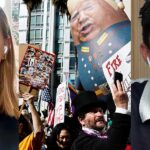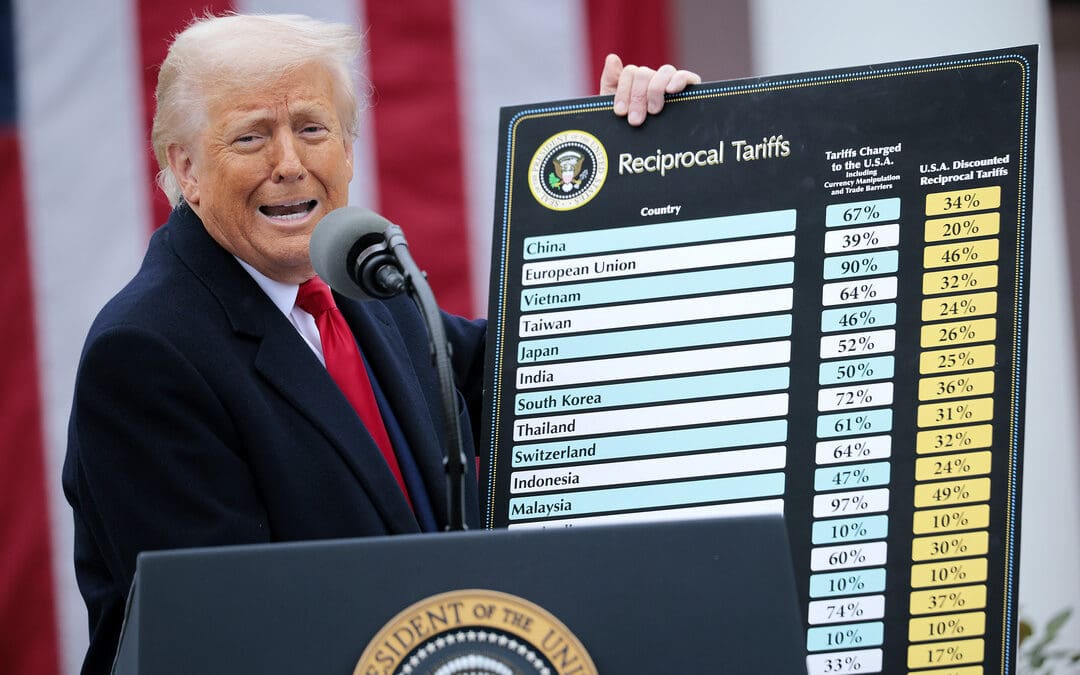
The Hubris Is Off the Charts
April 7, 2025
Massive Turnout at Anti-Trump Protests
April 7, 2025This is the moment of the conservative crack-up I’ve been waiting for. It’s going to sound small, but it’s the wedge of a wider fissure.
A legal nonprofit just filed a lawsuit against Donald Trump’s declaration of tariffs on China, claiming that the emergency authority he’s invoked gives him no such authority to impose these tariffs. Underneath or alongside that claim is a much deeper argument that it’s time for Congress to claw back its delegation of tariff authority, which it has effectively handed over to the president for decades now.
But here’s what is politically significant about this lawsuit: the nonprofit filing the suit is funded, in part, by Leonard Leo, the longtime leader of the Federalist Society. By most people’s estimations, Leo was the single most important architect behind all three of Trump’s appointments to the Supreme Court and the overwhelming number of judges Trump appointed to the federal bench during his first term. Leo is the heart and soul of the conservative legal movement, the Principia of the judicial right. His nonprofit, named the New Civil Liberties Alliance (of course), was also the force behind the court’s overturning of the Chevron doctrine last year.
That this may be The Thing that splits the Right will come as a disappointment to the Left, which is forever hoping that it will be some basic issue of human rights or fundamental constitutional morality that breaks up the Right. Good luck with that.
The tariffs were always going to be the thing that broke up the Right, for the very same reason tariffs were the leading edge of political conflict in the nineteenth century: because they implicate the entire political economy, and beyond the political economy, more foundational questions of power and control, which are always at the heart of every fundamental constitutional conflict. Behind the tariffs in the nineteenth century, or at least the first two-thirds of the nineteenth century, was the question of slavery.
I always had thought the opposition to the tariffs would come from Senate Republicans, and that opposition is obviously brewing there (Democrats got four Republican senators to vote with them on a symbolic vote on the issue). But the Senate GOP is still way too reluctant to take on Trump. As is corporate America, which is positively terrified of him. But it’s clear that the tariff is foundational to a big part of the Right, and that it is something that Leo — and by implication all those Federalist Society judges he made happen — not only cares about a great deal but is willing to go to the mat over.
The irony is that conservative free traders have long wanted to give the president power over tariffs because they didn’t trust Congress to abide by the free-trade thing. Members of Congress, particularly in the House of Representatives, were thought to be too close to the people and thus too parochial to defend the larger national interest in free trade. So better to give power over trade to the president. That’s changed with Trump, obviously, so now the tariff is going to be the major issue that leads the judicial right to confront the empowered executive that they’ve turbocharged in so many other ways.
I know it’s perverse of me, but it’s kind of what I love about this country: these maximal foundational questions of major political morality always get pressed and pushed into what seem like these teeny-tiny questions of law and policy and institutional delegation. No one can ever explicitly argue the very big questions in this country, but they somehow know, in their weird legalese, how to conscript the tiniest questions to serve as instruments of those bigger questions. It’s bizarre and makes for a profound bad faith in our arguments. We’re never really arguing about what we care most about.
But that is what makes our arguments so fascinating and furious. It’s like a family that argues over the stupidest things because it can’t argue over the real conflicts at stake. Our super-technical debates can never really support the full weight of what the protagonists in these debates are really arguing about. And they can’t admit that. But it does make the job of unpacking and interpreting those debates almost the equivalent of a psychoanalyst’s interpretation of a dream.
Great Job Corey Robin & the Team @ Jacobin Source link for sharing this story.





